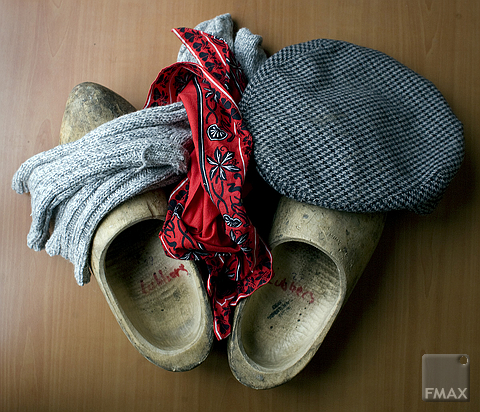The members of DSDG Tubantia all come from Twente, a rural region in the east of the country, and they all cherish their rural roots. Tranquility is one charm of Twente life, although not on the third day after Christmas, because that’s when Tubantia’s members traditionally return to Twente to disturb the peace.
“This tradition started in 1927”, says Koen Lubbers, a Tubantia member. The visit of TU Delft’s ‘tukkers’ – as people from Twente are nicknamed – starts with a ride on a covered wagon. “We used to ride on an open wagon”, Lubbers explains, “but unfortunately the law now requires a covered wagon, which is less fun but much warmer.” To keep warm during the ride, the group of twenty or so tukkers rely on two things: firstly, they all dress up in traditional farmer clothes, including wooden shoes, farmer hats and red handkerchiefs tied round their necks; and secondly, they drink lots of ‘Foezel’, a local brandy-like drink, which Lubbers says is ‘really disgusting but keeps you warm.’ After a few hours on the wagon, the students stop at a local restaurant, where they eat krentenwegge (currant bread) by the fireplace. “After this the ride continues to a local campsite”, Lubbers says, “where we sit by the fire and eat boerenkool, a traditional Dutch dish.” During dinner, the tukkers loudly sing the songs of Bennie Jolink and Normaal, a band especially popular in rural regions. Eventually the group ends up in a local bar in Enschede or Hengelo, still dressed in their farmer clothes. “Usually our outfits don’t prevent us from being let into these bars”, Lubbers says, “although a discotheque might be more difficult, but we haven’t tried yet.”
De stichting Vrienden van de Botanische Tuin vreest dat de bouw van een aanpalend appartementencomplex de tuin ernstig schaadt. Zij heeft daarom bezwaar ingediend bij de Raad van State tegen het bestemmingsplan TU-Noord. De zitting is donderdag 12 maart.
Dat plan biedt de mogelijkheid om het Kluyverlaboratorium, het gebouw van Technische Natuurwetenschappen dat grenst aan de botanische tuin, om te bouwen tot een luxe appartementencomplex. De TU wil het gebouw verkopen aan een projectontwikkelaar.
“We vrezen voor de waterhuishouding van de tuin als onder het complex parkeergarages komen”, licht secretaris Hans Hirs toe. “Bomen zouden als gevolg daarvan kunnen uitdrogen.” Ook hekelt hij het plan van de projectontwikkelaar om een extra vleugel aan het gebouw te plakken. Die vleugel moet in de tuin komen.
Enkele jaren geleden heeft de stichting al bezwaar ingediend bij de gemeente. Daarna is ze naar de provincie gestapt. En nu is het eindstation in zicht, het oordeel van de Raad van State. De Raad doet waarschijnlijk over enkele maanden uitspraak.
Behalve de Vrienden van de Botanische Tuin heeft belangenvereniging TU-Noord bezwaar aangetekend.
Ook de TU heeft vorig jaar een beroepschrift ingediend bij de Raad van State. Maar doordat de universiteit de 285 euro griffierecht te laat betaalde, is de TU ‘niet-ontvankelijk’ verklaard en staat ze feitelijk buitenspel. Een belangrijk bezwaar van de universiteit richtte zich tegen de aanduiding ‘cultuurhistorisch waardevolle bebouwing’ bij de gebouwen Technische Botanie, Gele Scheikunde en Fysische Technologie. Door zo’n aanduiding kan het verkrijgen van bouw- en sloopvergunningen bemoeilijkt worden.
In 2012 verlaat de afdeling biotechnologie het Kluyverlaboratorium. Directeur drs. Bob Ursem van de botanische tuin wil het leegkomend gebouw hergebruiken en er een nieuw laboratorium in onderbrengen voor al zijn onderzoeksprojecten. ‘Dat kan straks met het geld van onze patenten’, zei hij onlangs in Delft Integraal.



Comments are closed.